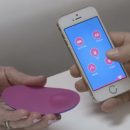The 6 Sex Tech Companies Facing Lawsuits for Patent Infringement
Legal troubles may dramatically change the market for remote sex.

California-based company TZU Technologies is suing six sex tech companies for willful infringement of its patent that controls the remote sex market.
Called Method and device for interactive virtual control of sexual aids using digital computer networks, the patent covers the communication of sex toys over the Internet. It’s nicknamed the ‘268, which are the last three digits of its U.S. patent number.
According to the Vstroker [NSFW] founder who goes by the name Troy Peterson, TZU Technologies recently obtained the rights to the patent from his company Hassex, Inc. It’s unclear whether Peterson still owns Hassex, Inc., but we will have further information on the subject in the coming week.
The sex tech companies being sued include:
Comingle
This is not shocking news. In its June newsletter, Comingle said shipment of its Mod vibrator was delayed after receiving a cease and desist letter from a patent holder. We can only assume the company was referring to the ‘268.
However, in the same message the company made it seem like the legal woes had been resolved, saying “…it took up a lot of our time. We’re back on track now though.”
Comingle specializes in making open-source sex technology.
FriXion
Named as Happy Haptics, Inc. in the lawsuit, FriXion is an adult social platform that allows users to have online sex with one another through Internet-connected devices. It’s private and still in beta.
The most touted device it supports is the Novint Falcon, which was originally used in shooting games, but repurposed to hold sex gadgets like dildos and male sex sleeves.
FriXion co-founder Seth spoke to Future of Sex last year. He was full of optimism that his virtual sex system would move ahead, citing that he’d made agreements with patent owners who held wide-ranging rights to remote sex.
“Where people have failed, where we haven’t, is making the deals,” he said.
RealTouch
Trouble with the ‘268 is nothing new for the makers of the RealTouch. In 2010, Internet Services, LLC, was sued for patent infringement by Hassex, Inc. and New Frontier Technologies Corporation.
The company was forced to stop selling the interactive sex device in 2014, five years after it hit the market. It couldn’t afford to continue licensing and manufacturing the product.
In the current round of lawsuits, both Internet Services, LLC and WMM Holdings, LLC are being sued for selling RealTouch products.
LovePalz
LovePalz, under the company Winzz, LLC, sells interactive sex devices for men and women. In October 2014, it launched a beta version of its adult social network called the LovePalz Club.
Vibease
Vibease is a wearable, smart vibrator controlled by Android devices and iPhones. The silicone sex device syncs its movements to go along with action in erotic audio stories.
Other defendants
Also being sued are Holland Haptics, which created a virtual handholding device called Frebble. Named with them is the crowdfunding platform Kickstarter, which allowed the company to raise funds on its website
What does this mean for the future of remote sex? If TZU Technologies is successful, the above players will likely be locked out of the market, limiting what teledildonic products are available in a fledgling industry. Either way, the companies may face financial trouble after paying legal fees and have difficulty staying afloat.
However, whatever happens, the ‘268 patent is set to expire in 2018, meaning concerns over its stronghold on the development of sex tech could soon be history.
We will provide updates to the patent lawsuits as they develop. Also, stay tuned because in the next week Future of Sex plans to share more about the history of the ‘268 patent and shed more insight on the current legal situation.
Featured image source: succo
9 comments
Leave a reply
You must be logged in to post a comment.


















Isn’t there some sort of legislation that prohibits “nonsense” patents in the united States?
The whole IoT market would be dead if that was possible with other “device-classes” like fridges or heating — nobody would ever accept that somebody gets a patent for ” that communicates over the internet”
Reading this patent it becomes obvious that it has no other substance than describing that a (motorized) device is connected to a computer via some sort of serial communication outlet and then controlled by a software that incorporates an internet socket — how can this be patent-worthy?
Isn’t it possible that the above mentioned companies team up to try and find a judge who declares this patent void?
That’s a really interesting point. I’m not sure of such legislation, but the U.S. Code says that conditions for patentability are novelty and non-obvious subject matter: https://www.law.cornell.edu/uscode/text/35/part-II/chapter-10
The route Comingle is going down, from what I know, is to say the patent isn’t for a novel invention and they have been looking for prior art to prove this: https://futureofsex.net/remote-sex/comingle-seeks-prior-art-and-is-raising-funds-for-patent-defense-case/ So far it looks like they have found some descriptions and images of what looks to be prior art for this “teledildonics” patent, but I’m not sure what a judge would say.
The first over the internet devices were used by ifriends live cam models about 15 years ago. Referred to then as CyberDildonics. These communicated not with a socket but actually used a chat room type of plug in that allowed a user to control four boxes in the shape of a square and choose patterns and colors which in turn could allow changes in the energy flow from the batteries to the device.. The battery power of the toy the model would use, in this communication between the viewer and the mode’s toyl, could be manipulated via the toy’s “eye,. Basically this extra service that ifriends featured which was a battery operated vibrator that had a power interrupt and would decrease and could be controlled when connected via a small photoelectric eye. The eye would then allow pulses of power based upon what the “eye” saw. So a more intense darker color for example would then allow more power to the toy and the vibration increased. The four boxes could be set to pulse patterns and there by controlled over the internet by the viewer making waves of high and low pulses. Or rhythmic pulses . The models could charge more for this ability and the viewer had some control over the model and what kind of manipulation she would get. There were a few different available types of devices. One was an actual penis looking vibrator that would enlarge by an inch and retract which would also be manipulated. Basically the pace of the thrusts and the intensity of the vibration could be controlled or so was the idea. The person who invented this idea actually is the first idea that used an internet connection. So the company suing everyone is actually just a more advanced copy cat of someone elses idea anyway. The patent does seem at first glance to be a bit abstract for the technology guidelines. However it does not mention the use of other types of connections such as attaching a remote controlled device to the screen via wireless technology so I think there may be room to invalidate their claim.